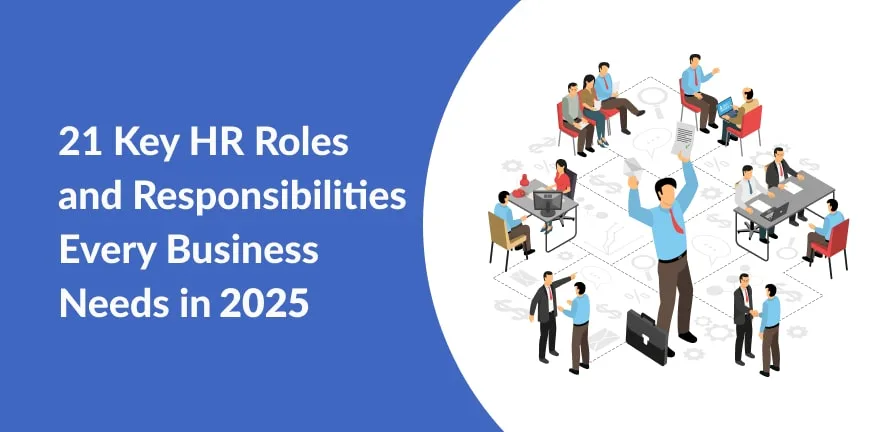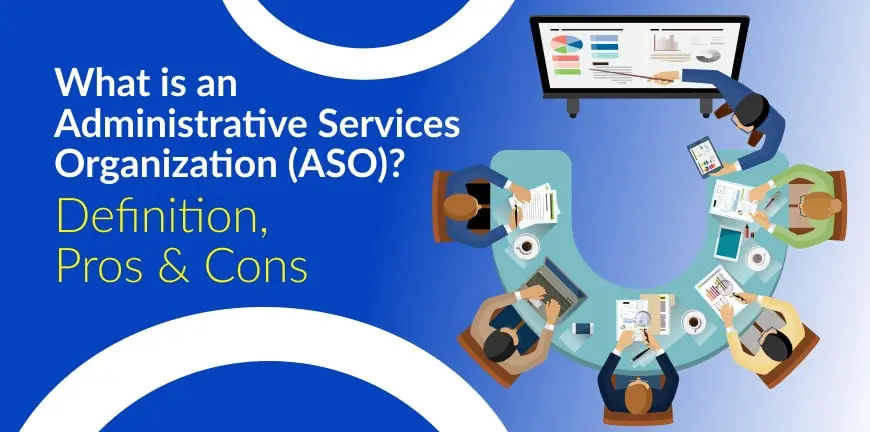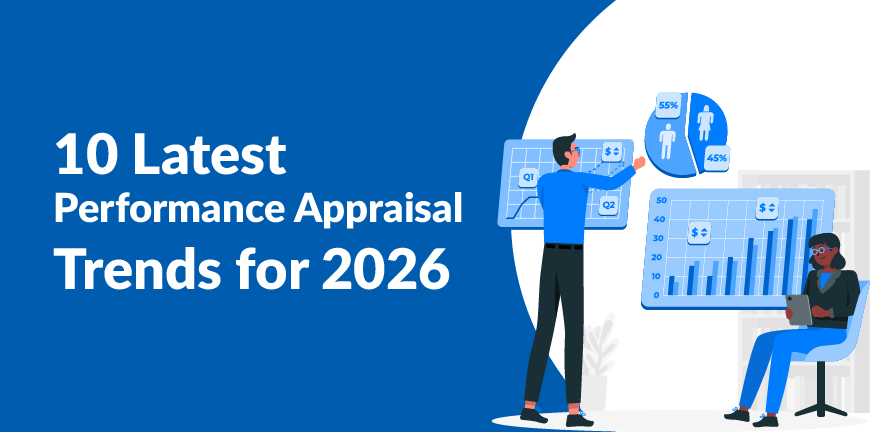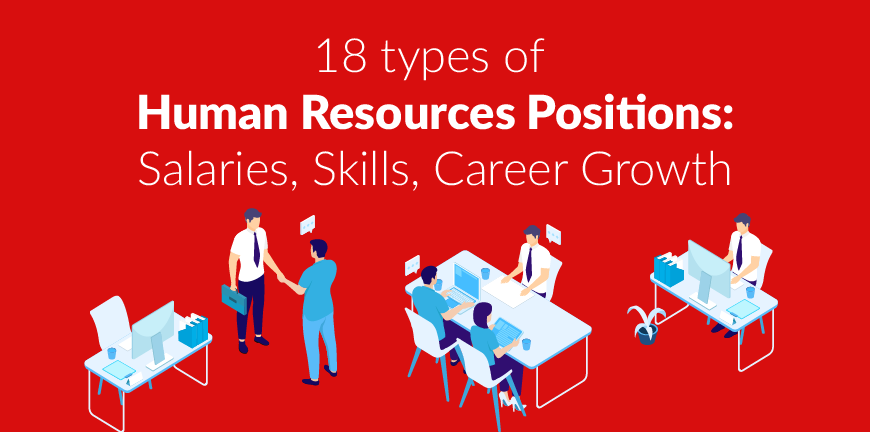
Employment Laws in India 2026: Key Rights & Compliance Guide
22/12/2025
Cognitive Skills: What They Are, Why They Matter, and How They’re Used
22/12/2025- What Are HR Roles and Responsibilities?
- What Are the 21 Key HR Roles and Responsibilities?
- Why Are HR Roles and Responsibilities Important for Businesses?
- What Skills Should Every HR Professional Have?
- What Job Designations and Career Paths Exist in HR?
- How Do HR Roles Benefit Both Employees and Employers?
- Frequently Asked Questions
Human resource professionals today are not restricted to performing administrative tasks. Gone are the days when HR managers and departments were buried under resumes and documents. With time and a massive wave of advanced technology taking its course, the roles have transformed, and they are now the cornerstone of intelligently shaping an organization’s priorities. Tom Haak, HR expert, says, “Listening is the first step in communication.” A reminder that the foundation of HR lies in understanding, not just directing.
What Are HR Roles and Responsibilities?
HR roles and responsibilities involve handling and monitoring all areas of human resource functions.HR managers are focused on hiring, training, and forming a bridge between top management and its employees.
They are responsible for working as partners with employers by synchronizing HR strategies with business objectives, nurturing a positive work environment.
What Are the 21 Key HR Roles and Responsibilities?
Let us walk you through the different HR roles and responsibilities in HRM (Human Resource Management) that craft the future of organizations:
1. Talent Attraction
Attracting skilled talent is an art, and to do that, HR managers scout for the right talent by utilizing their resources optimally.
They use their wide databases, talent banks, and capitalize on a robust employer brand to hire top-tier candidates.
They also help organizations write comprehensive and appealing job descriptions to draw top talent. Their aim is nothing but to align the selected candidates with the objectives and vision of businesses.
2. Candidate Selection
The role of candidate selection is another significant step HR performs responsibly by filtering candidates as they receive applications and candidate profiles.
They carefully sort and sift through the applications using modern techniques, assessments, visual interactions, etc.
The sole responsibility is on the HR to determine and choose the most suitable candidate who would cater to a specific job role and company goals.
3. Recruiting Internally and Externally
Efficient HR teams can build robust talent banks within the organization by effectively training employees within the organization by helping them with the necessary resources.
They also create talent development plans and can place the existing capable employees in roles that are suitable and open.
This is a good opportunity for employees as they can grow professionally. However, certain roles that are not available internally are sourced from outside.
4. Performance Evaluation
Among the various HR roles, one of the many significant responsibilities of the department is to review the performance of employees over a period and provide them with constructive feedback.
This process is to enable employees to grow professionally and cater to the company’s objectives.
The HR department is responsible for designing a structured appraisal process. The HR department also trains managers on how to give proper feedback, improving the employee-manager relationship.
5. Renumeration Process
We all know how important salary is, and offering a fair compensation package is a vital HR department task.
Fair and substantial compensation can draw top-notch candidates and boost the morale of existing employees to work better.
The key job of the HR department here is to create compensation guidelines and develop a plan for salary structures and packages.
They also address compensation-related issues to keep the functions running smoothly.
6. Staff Benefit Management
According to surveys and research, extra pay is not the only thing that appeals to employees, but substantial benefits and perks do.
The responsibility of HR is to plan and create a solid plan that is in sync with the long-term business goals.
The needs of individuals vary, so HR ensures that all the needs are met by providing a comprehensive benefits package.
7. Skill Development and Training
The HR roles and functions include the initiation of learning and development activities for the staff. It is their responsibility to prepare them if any crisis or uncertain situations arise in the future.
They usually conduct training sessions, job rotation, on-the-job training, etc. It has been observed that the L&D processes are beneficial for employees as they cater to their personal and professional skill development plans and the goals of an organization.
The HR formulates a strategy by assessing the requirements of a team and individual employees and facilitates the programs proactively.
8. Focus on Promotions
HR sets rules and criteria for promotions. Promotion is an essential aspect as it determines the fate of an employee.
Promotion is offered based on employee performance, seniority, etc. HR forms a plan after analysing the performance and capabilities of employees.
The process is an incentive for individuals as they are motivated to work on enhanced productivity.
The promotion initiatives help employees meet their own and the employer’s expectations.
9. Quality Circles
The HR department forms groups or circles that are exclusively made to address issues within the company.
There could be problems related to employees, operational problems, and sorting out quality and production-linked errors.
These groups consist of a leader or a facilitator who helps individuals express their problems and the organization’s problems.
10. Quality Control
TQM, or total quality management, is a practice where organizations work towards creating an environment where individuals enhance their skills to deliver services and products effectively.
The HR department partners with organizations to facilitate the quality check process. They help introduce tools and charts outlining the roles and responsibilities for departments across a company.
They use data to determine the loopholes, offer proposals regarding improvements, and analyse process impacts.
11. Handing Out Information
HR departments share valid information with employees and keep everyone updated with the latest news, trends, events relevant changes, etc.
Timely and smooth communication in terms of information is beneficial for creating and sustaining company changes.
Information sharing is also about sharing internal expertise, and the HR teams execute the process where employees can discuss, meet, and share valuable information.
They also conduct sessions where experts are invited, and the professionals share their knowledge with employees.
12. Overall, Company Growth
Organizational development aims to strengthen the organization and make it more productive and competitive.
The development process begins from the moment new job vacancies are created and when job analysis is conducted. The primary step is to determine what the right professional will possess.
HR is also a part of designing jobs, where they help organizations create roles and tasks, structuring them to align with employers and candidates.
The management of talent initiated by Hr is also an important part of organizational development.
13. Handling Survey
Amidst a variety of HR roles and functions, one important role is to manage surveys. There can be different types of surveys, like engagement surveys, feedback surveys.
These methods make employees aware of and understand the status of the organization, employee behaviors, and what needs to be done to improve productivity by managing people.
The HR is also in charge of collecting valuable data to get the best survey results. The data is gathered and kept in a central system, ensuring a fast process.
14. Administering Compliance
One of the most critical aspects of HR roles and responsibilities is to comply with the laws, rules, and government policies.
They mitigate the legal risks and ethical fallouts by adhering to the necessary laws.
Tackling the procedures of grievances is also a part of compliance handling, where the HR resolves various issues and conflicts that might adversely affect the operations of a firm.
15. Business Alliance
HR and businesses are nothing but partners. The HR collaborates with businesses and provides critical and intelligent inputs to enhance operations.
To successfully be partners, the HR team must understand the business and its internal functions properly.
They act as reliable advisors for senior management and executives, offering guidance in every step.
HR managers are focused on building long-lasting relationships with top management and stakeholders.
16. Managing Data
With technology transforming human resource developments, HR managers and departments have a new task of understanding data analytics and determining impactful results. More effective decisions can be made with accurate data.
The HR team works with benchmarks and conducts people analytics to convert the data into concrete actions.
The HR gets a fair idea about how things are working and what needs to be done by continuously analyzing and monitoring data. According to reports, 71% of companies prioritize people analytics, and those using it report 3.1× better talent outcomes
17. Handling Modern Tech
The management of technology in HR is a vital component of HR roles and responsibilities.
With the advent of AI and advanced technology, HR departments utilize modern software and tools to expedite processes.
This facilitates efficient and fast practices, accelerating the employee journey.
It is also a boon for businesses as they can exponentially save time and costs. As per research, 80% of firms are expected to integrate AI into HR functions by 2025.
18. Management Change Activities
It is a globalized economy today, and companies constantly experience change.
The fluctuating market enables HR teams to take charge and handle the changes that occur in management.
They devise new plans and methods to empower and encourage the workforce to get attuned to the new developments.
The HR department ensures that employees and employees embrace the changes without hesitation.
According to reports, around 53% of HR leaders have expressed fatigue from organizational change, and 47% have said that employee experience is a priority.
19. Enhancing Employee Experience
According to the latest research, 70% of HR professionals link employee experience to business success; 78% say recognition motivates retention.
We can today understand the significance of employee experience and how it influences the growth of a company.
From the inception of an employee’s career path in an organization till their stay and thereafter, organizations must make it their business imperative to enhance how employees feel and think.
The more employees feel engaged and motivated they will contribute. They will be immensely beneficial to the growth of the organization and will stay longer.
20. DEIB
Diversity, Equity, Inclusion, and Belonging are four key elements that can shape the future of organizations.
Whether you are a small firm or a large enterprise, introducing DEIB is not a trend but a norm now.
There is a slew of youngsters who search for companies that promote and foster this culture.
In many companies, HR plays a vital role in taking DEIB initiatives in consultation with leadership and management.
21. Smooth Onboarding
To make employees stay for long in a company, you, as an HR leader or manager, must make every effort to formulate effective methods of onboarding new individuals.
You must ensure smooth and meaningful integration. Introduce virtual onboarding methods with in-person interactions.
You must share valuable information about the company, its traditions, testimonials, etc, to make new employees feel respected and welcome.
Why Are HR Roles and Responsibilities Important for Businesses?
The HR department roles and responsibilities are critical for the growth and prosperity of businesses. They bring together people, procedures, and performance that align with business objectives. Let us show you the reasons why it matters for businesses:
- Talent Search and Sustaining Talent- One of the most important strategic roles for HR is finding suitable talent for job roles, ensuring that they don’t quit easily.
- Development and Growth of Employees- HR plays an essential role in tutoring, mentoring, and developing skills in employees. This is to ensure that the employees contribute to the organizational growth to the fullest.
- Maintenance of Office Culture- It is the responsibility of HR to design the future of organizations by managing and maintaining the culture and values.
- Facilitate Reconciliation and Employee Rapport- HR is usually essential in managing internal disputes. They try to build stealthy employee relations, nurturing a positive work landscape.
- Smart Manpower Planning- HR, with its deep understanding, synchronises the capacity of teams with future business objectives.
What Skills Should Every HR Professional Have?
The roles and responsibilities of HR manager are defined by the skills they possess. Here are a few skills that HR professionals should have:
- Communication – You, as an HR professional, must have a clear and convincing communication style that aligns with hiring, solving disputes, and engaging employees.
- Emotional Intelligence (EQ)- This element plays a vital role today. This is when you, as an HR professional, understand employee needs and views, connect with them, and empathise.
- Hiring and Talent Acquisition Knowledge- You must be thorough in recruitment methods that include powerful sourcing, interviewing, and candidate assessment skills. You must also be well-versed in AI-powered tools and tech-driven hiring platforms.
- Data-Driven and Logical Mindset – If you are an Hr professional, your mind must function analytically as you need to utilize Hr analytics and interpret data, driving planning and intelligent decision making.
- Proficiency in Laws and Regulations- As an HR manager, you must be well-versed in the ever-changing rules, laws, and mandates to prevent legal repercussions.
- Leadership & Future Readiness- HR managers and professionals are not just present to recruit and manage people, but they go the extra mile to assist both the leaders and employees, driving them towards future growth.
They act as anchors during times of organizational transformations, like technology adoption or management changes etc.
What Job Designations and Career Paths Exist in HR?
Now that we have explored the HR roles and responsibilities, let us have a look at the potential career opportunities that HR offers:
- Senior Level Roles- HR Manager, Employee Relations Manager, People Analytics Lead, OD Manager, etc.
- Mid-Level Roles- HR Specialist, HR Generalist, Recruitment Manager, Training Manager, etc.
- Entry level- Intern/Trainee- HR Coordinator, Assistant, Recruitment Executive, etc.
How Do HR Roles Benefit Both Employees and Employers?
The role of HR manager in HRM is advantageous to employers and employees. Let us see how:
Employer Benefits
- Recruitment of top talent and retaining them
- Enhanced Productivity and outcomes as HR helps cultivate a pleasant work landscape and foster engagement
- Compliance with rules and laws, eliminating risk
- Smart manpower structures ensuring the right individuals are selected to cater to the business objectives and job positions.
- Work culture gets a boost as HR works towards maintaining a positive work space and uplifting the morale of employees.
Employee Benefit
- Guidance and resources to support career growth
- Unbiased treatment and fair opportunities
- Fair Compensation and Perks
- Sound employee performance management and feedback
- Employee well-being systems and support
Key Takeaways
- HR is No Longer Just Administrative
- HR Scope is Defined by Vital Expanding Roles
- Future-Preparedness is Essential
- Employers and Employees Both Benefit From HR
- Diverse Career Growth Possible in HR
Frequently Asked Questions
1. What are the roles and responsibilities of an HR manager?
An HR manager is responsible for many functions, including strategic workforce planning, talent acquisition, ensuring employee engagement, legal compliance, etc.
2. What is the strategic role of HR in business success?
The strategic role of HR is to essentially find individuals for the workforce who cater to the business goals.
3. What is the role of an HR manager in HRM?
The role of an HR manager is critical in Hyman Resource Management as they are responsible for monitoring the recruitment cycle, ensuring that employee needs and business goals are aligned.
4. How do HR department roles and responsibilities differ from HR job roles?
HR department roles are essentially broader, and they cover all the functions related to the workforce and employers, while HR job roles are specific tasks assigned to specific individuals.
5. What are the different HR roles in an organization?
The various HR roles in an organization include recruitment and staffing, onboarding, compensation and benefits, training and development, performance management, employee relations, and compliance management.
6. What are the HR roles and responsibilities matrix?
HR roles and responsibilities highlight particular HR duties and responsibilities of varied positions in a company.
Contact Us For Business Enquiry

Rajkumar Shanmugam
Rajkumar Shanmugam is the Head of HR at ALP Consulting, bringing over 19 years of comprehensive HR leadership experience across India and international markets. His expertise spans talent acquisition, employee relations, performance management, compliance, and HR transformation. Rajkumar has a proven track record of driving people-centric initiatives, enhancing workplace culture, and aligning HR strategy with business goals. With extensive experience in US staffing operations and global mobility, he continues to lead organizational excellence through innovation and employee engagement.




